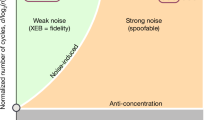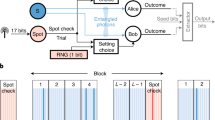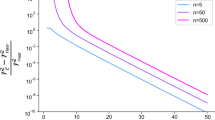Abstract
Are there fundamentally random processes in nature? Theoretical predictions, confirmed experimentally, such as the violation of Bell inequalities1, point to an affirmative answer. However, these results are based on the assumption that measurement settings can be chosen freely at random2, so assume the existence of perfectly free random processes from the outset. Here we consider a scenario in which this assumption is weakened and show that partially free random bits can be amplified to make arbitrarily free ones. More precisely, given a source of random bits whose correlation with other variables is below a certain threshold, we propose a procedure for generating fresh random bits that are virtually uncorrelated with all other variables. We also conjecture that such procedures exist for any non-trivial threshold. Our result is based solely on the no-signalling principle, which is necessary for the existence of free randomness.
This is a preview of subscription content, access via your institution
Access options
Subscribe to this journal
Receive 12 print issues and online access
$259.00 per year
only $21.58 per issue
Buy this article
- Purchase on SpringerLink
- Instant access to full article PDF
Prices may be subject to local taxes which are calculated during checkout


Similar content being viewed by others
References
Bell, J. S. Speakable and Unspeakable in Quantum Mechanics Ch. 2 (Cambridge Univ. Press, 1987).
Bell, J. S. Speakable and Unspeakable in Quantum Mechanics Ch. 12 (Cambridge Univ. Press, 1987).
De Finetti, B. La prévision: Ses lois logiques, ses sources subjectives. Ann. de l’Inst. Henri Poincaré 7, 1–68 (1937).
Renner, R. Symmetry of large physical systems implies independence of subsystems. Nature Phys. 3, 645–649 (2007).
Kofler, J., Paterek, T. & Brukner, C. Experimenter’s freedom in Bell’s theorem and quantum cryptography. Phys. Rev. A 73, 022104 (2006).
Hall, M. J. W. Local deterministic model of singlet state correlations based on relaxing measurement independence. Phys. Rev. Lett. 105, 250404 (2010).
Barrett, J. & Gisin, N. How much measurement independence is needed to demonstrate nonlocality? Phys. Rev. Lett. 106, 100406 (2011).
Hall, M. J. W. Relaxed Bell inequalities and Kochen-Specker theorems. Phys. Rev. A 84, 022102 (2011).
Lorenzo, A. D. Free will and quantum mechanics. Preprint at http://arxiv.org/abs/1105.1134 (2011).
Pearle, P. M. Hidden-variable example based upon data rejection. Phys. Rev. D 2, 1418–1425 (1970).
Braunstein, S. L. & Caves, C. M. Wringing out better Bell inequalities. Ann. Phys. 202, 22–56 (1990).
Colbeck, R. & Renner, R. No extension of quantum theory can have improved predictive power. Nature Commun. 2, 411 (2011).
Barrett, J., Hardy, L. & Kent, A. No signalling and quantum key distribution. Phys. Rev. Lett. 95, 010503 (2005).
Conway, J. & Kochen, S. The free will theorem. Found. Phys. 36, 1441–1473 (2006).
Conway, J. H. & Kochen, S. The strong free will theorem. Notices AMS 56, 226–232 (2009).
Santha, M. & Vazirani, U. V. in Proc. 25th IEEE Symposium on Foundations of Computer Science (FOCS-84) 434–440 (IEEE Computer Society, 1984).
Colbeck, R. Quantum and Relativistic Protocols For Secure Multi-Party Computation PhD thesis, Univ. Cambridge (2007); available at http://arxiv.org/abs/0911.3814.
Pironio, S. et al. Random numbers certified by Bell’s theorem. Nature 464, 1021–1024 (2010).
Colbeck, R. & Kent, A. Private randomness expansion with untrusted devices. J. Phys. A 44, 095305 (2011).
De, A., Portmann, C., Vidick, T. & Renner, R. Trevisan’s extractor in the presence of quantum side information. Preprint at http://arxiv.org/abs/0912.5514 (2009).
Trevisan, L. Extractors and pseudorandom generators. J. ACM 48, 860–879 (2001).
Scheidl, T. et al. Violation of local realism with freedom of choice. Proc. Natl Acad. Sci. USA 107, 19708 (2010).
Dodis, Y., Ong, S. J., Prabhakaran, M. & Sahai, A. in Proc. 45th Annual IEEE Symposium on Foundations of Computer Science (FOCS-04) 196–205 (Lecture Notes in Computer Science, IEEE Computer Society, 2004).
Barrett, J., Kent, A. & Pironio, S. Maximally non-local and monogamous quantum correlations. Phys. Rev. Lett. 97, 170409 (2006).
Colbeck, R. & Renner, R. Hidden variable models for quantum theory cannot have any local part. Phys. Rev. Lett. 101, 050403 (2008).
Acknowledgements
We thank V. Galliard for useful discussions and L. del Rio for the figures. Research at Perimeter Institute is supported by the Government of Canada through Industry Canada and by the Province of Ontario through the Ministry of Research and Innovation. R.R. acknowledges support from the Swiss National Science Foundation (grant No 200020-135048, the National Centre of Competence in Research QSIT and the CHIST-ERA project DIQIP) and from the European Research Council (grant No 258932).
Author information
Authors and Affiliations
Contributions
Both authors contributed equally to this work.
Corresponding author
Ethics declarations
Competing interests
The authors declare no competing financial interests.
Supplementary information
Supplementary Information
Supplementary Information (PDF 549 kb)
Rights and permissions
About this article
Cite this article
Colbeck, R., Renner, R. Free randomness can be amplified. Nature Phys 8, 450–453 (2012). https://doi.org/10.1038/nphys2300
Received:
Accepted:
Published:
Issue date:
DOI: https://doi.org/10.1038/nphys2300
This article is cited by
-
Advances in device-independent quantum key distribution
npj Quantum Information (2023)
-
Loophole-free Bell inequality violation with superconducting circuits
Nature (2023)
-
Optimal measurement structures for contextuality applications
npj Quantum Information (2023)
-
A comprehensive review of quantum random number generators: concepts, classification and the origin of randomness
Quantum Information Processing (2023)
-
Sharing quantum nonlocality in star network scenarios
Frontiers of Physics (2023)



